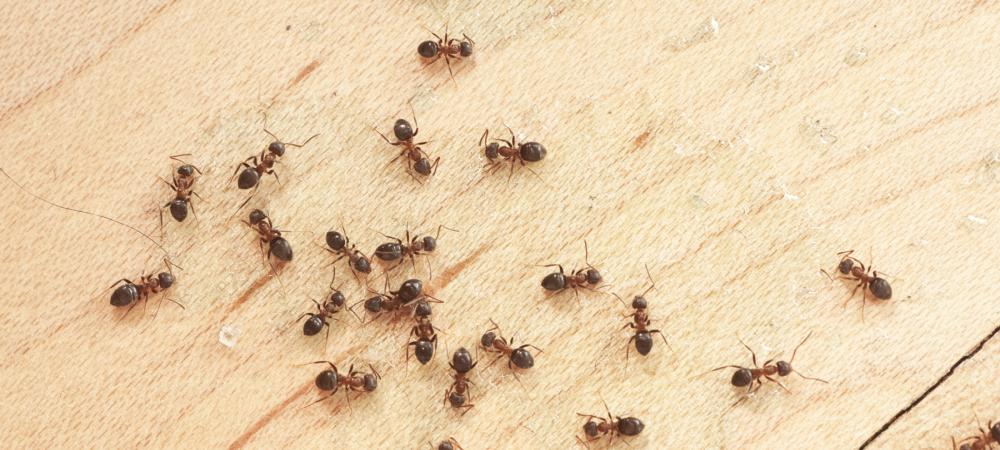Safe Ways to Get Rid of Ants in and Around Your Home

What Attracts Ants to the House?
Ants are like any other living creature; they need the essentials of food and water to survive. The worker ants you see in your pantry, garage, or kitchen counter are not just gathering food for themselves but for the queen, her brood, and thousands of soldiers and worker ants that exist to serve and protect the colony. Even if your home is clean, you may unwittingly be providing ants with everything they need to subsist. Here are some of the resources that may be attracting ants to your home:
- Water - Ant colonies need water, and worker ants may find sources in places you’d never expect. Small pieces of moisture-laden fruit or vegetables will readily be taken back to the nest, while carpenter ants may extract moisture from damp and rotting wood. Even a small leak in the pipe under your sink can be a potential water source for ants.
- Carbohydrates - It’s easy to miss those cookie crumbs under the sofa or small amounts of juice spilled from your child’s sippy cup. But to an ant, these unintended offerings represent a staple for their hungry colony. Like us, ants love sugar and can’t get enough of anything sweet or starchy.
- Pet Food - Part protein, part carbs, pet food is a particular favorite with ants. Any homeowner with an ant problem is familiar with the sight of hundreds of ants swarming their dog’s food bowl.
- Nesting sites - It’s not just food that attracts ants. When the weather gets cold, ants may look for a more temperate home for their colony. That could be inside your baseboards or in your home’s foundation. If you’ve recently treated your lawn with a pesticide for other insects, this also may drive ants indoors.
Will Ants Go Away on Their Own?
In a perfect world, we could keep our house so clean that ants would feel unwelcome and leave. But the problem is size. These are small insects that live in large numbers. As a collective, the colony has a huge appetite and tiny ants can fit into spaces and find food and water sources we may not be aware are there. As a species, ants are transient and always on the move. But even if the current infestation moves on, you can be certain another colony is nearby to take its place.
Natural Remedies to Get Rid of Ants
Because humans have been dealing with ants long before the availability of modern pesticides, there are a host of DIY ant control measures that work to varying degrees depending on the type of ant and level of infestation. Here are some of the most popular ones:
White Vinegar
Ants communicate with chemicals called pheromones which they lay down for other ants to follow. This is why you see ants trailing in a straight line; they’re following the scent message left by other ants. A mixture of three parts white vinegar to one part water sprayed along ant pathways can cover that scent trail and disrupt the ants’ march towards food. The downside? Your kitchen may smell like vinegar.
Borax
Borax is a powdered laundry additive that’s also used for other cleaning purposes. But it does more than whiten your socks or add shine to your floors. Borax is an effective way to naturally get rid of ants. Many homeowners have had good results mixing borax with confectioners sugar to create a poison bait that ants take back to the nest. The downside? It’s unlikely to wipe out an entire colony. And worse, borax isn’t just deadly to ants. It’s also dangerous to pets.
Coffee Grounds
Perhaps it’s the texture. Maybe it’s the smell. But for some reason, ants don’t like coffee grounds, so sprinkling grounds in areas where you see ants may be a good deterrent. The downside? Coffee grounds won’t kill ants, which are smart enough to just find a new route. Also, you now have coffee grounds on your counter.
Essential Oils
Certain odors are proven to repel ants. Cinnamon, wintergreen, clove, and mint are go-to ant repellents for some homeowners. Peppermint plants are available at most garden centers and can be planted around your home as a natural deterrent. But essential oils work better due to their strong concentration. Oils can be wiped along ant trails with a cotton ball or mixed with a little water or witch hazel and used as a spritzer. As an added benefit they’ll make your kitchen smell nice. The downside? Essential oils don’t kill ants, and as with other repellents, the ants will just take another route to avoid them.
How Do I Get Rid of Ants Forever?
Because ants are so adaptable and persistent, DIY ant control won’t effectively get rid of ants in your home. Partnering with a trusted, experienced pest control company is the best option to reclaim your home from these invading insects. With 64 years of experience, Clancy Brothers Pest Control has the knowledge to identify the source and species of ant you’re dealing with, implement an effective ant treatment plan and apply a low-toxicity barrier that will keep ants from coming back.
